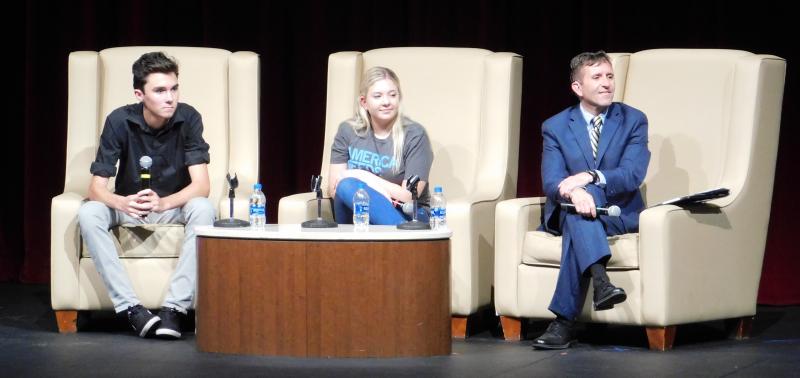Parkland shooting survivors speak at UMass Dartmouth
Hundreds of students from across the South Coast gathered at UMass Dartmouth on October 17 to hear from David Hogg and Jaclyn Corin about how they turned a tragedy into a political movement.
Hogg and Corin are survivors of the February 14, 2018 shooting at Marjory Stoneman Douglas High School in Parkland, Florida, which resulted in 17 deaths.
Corin, Hogg, and their classmates worked quickly in the aftermath of the shooting and established the March for Our Lives movement for gun control, youth empowerment, and getting out the vote. On March 24, the group led a march on Washington, supported by more than 800 supporting marches across the country.
Their story, and their message, resonated with many of the students, along with teachers, parents, and others from across the South Coast, who attended.
Ben Vieira, a seventh grader at Dartmouth Middle School, participated in one of the Marches for Our Lives.
“David Hogg is an incredible inspiration for me,” Vieira said.
Corin brought the audience through her experience during and after the shooting, and said she is still a regular high school student. She had researched gun violence and control for a school project, but she lived in what people jokingly called the “Parkland bubble”— the town had been named the safest community in Florida for eight consecutive years.
“When I was hiding [during the shooting], I knew what was going on,” she said. “I knew what was going on, and it wasn’t anything strange to me.”
She said after she got home safe, she turned on the news to watch helicopter footage of her high school and listen to a rising death toll.
“I knew a lot about the NRA, and I knew about what goes on in Congress to make sure that these tragedies keep happening, to make sure that gun manufacturers keep making money,” Corin said. “And so I was aware of the politics behind this issue. I didn’t think it was just one person that made this happen. I knew it was a whole collection of people that allowed this to happen at my school.”
She started calling politicians the morning after the shooting and began organizing a lobbying trip to the state capitol. She wanted to make sure Parkland would not be one name in a long list of shootings that seemed to have no effect on laws or the culture at large.
“When we had the media on us, we were the epicenter of the world at that point, we had to take that and run with it,” Corin said.
Corin encouraged those in the audience to become activists, even if they felt they weren’t old enough or educated enough to do so.
Hogg, who graduated from Marjorie Stoneman Douglas in 2018, also urged students to get involved politically and act on issues that matter to them.
“I’m going to talk to you guys not about the America that we want to create, but about the America that we are going to create,” Hogg said. “Our generation has the ability to go out there this November and every single election to make America the country it says it is on paper, not that it actually is.”
Hogg also addressed the limitations of his experience. The students at his high school, he said, are not what the majority of victims of gun violence look like. He and his classmates have tried to use their platform to raise the voices of other victims of gun violence in communities ranging from Chicago to Ferguson, Missouri, to Aurora, Colorado.
“As Americans, we have collectively decided that it’s easier to fight each other, than the issues we actually face as a society,” Hogg said.
Hogg emphasized the power that young people have to make themselves heard and affect change.
“It’s up to you to make that change,” Hogg said. “It’s up to you to stand up and say, ‘No! I am an American, I am a patriot, I am a person that is not going to accept violence and injustice in my community, whether it be discrimination or violence, any issue from clean water to climate change, to immigration, to gun violence.’”
Many audience members were empowered and invigorated by the event.
“I want to start things in my community and have a voice, but I didn’t have the the tools to do that,” said Allisyn Norbit, a student from Diman Regional Vocational Technical High School in Fall River. Norbit said that she feels especially connected to the cause because she is a student who goes to school every day.
Hogg and his younger sister, Lauren Hogg, co-wrote a book titled “#NeverAgain: A New Generation Draws the Line.” The co-founders of the March for Our Lives movement authored a book of essays titled “Glimmer of Hope.”
A recording of the lecture can be viewed at www.umassd.edu/live/lawrence-lecture.













